Search Results for: Whales
Skip to resultsCan’t find what you’re looking for? Visit our FAQ page.
1,418 results for: Whales
-
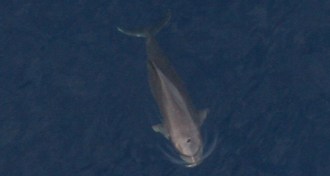 Animals
AnimalsSmall sperm whale species share a diet
Dwarf and pygmy species of sperm whales overlap in what they eat, and that could be a problem as the food web changes around them.
-
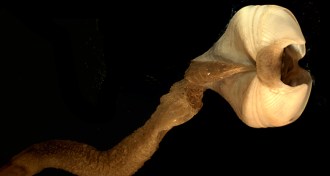 Oceans
OceansThe surprising life of a piece of sunken wood
Timber and trees that wash out to sea and sink to the bottom of the ocean hold a diverse community of organisms.
-
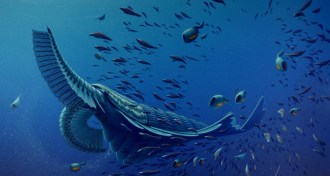 Paleontology
PaleontologyAncient oceans’ top predator was gentle filter feeder
New fossils suggest that a distant relative of lobsters used bristled limbs to net its prey, not spike it.
-
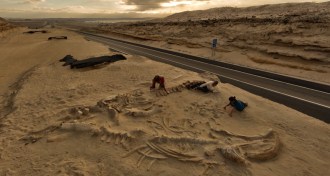 Animals
AnimalsAlgal blooms created ancient whale graveyard
Whales and other marine mammals died at sea and were buried on a tidal flat in what's now in the Atacama Desert in Chile.
-
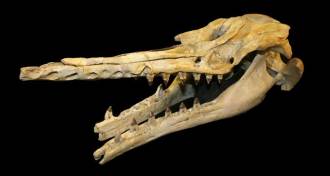 Paleontology
PaleontologyFossil whale skull hints at echolocation’s origins
Ancestors of toothed whales used echolocation as early as 34 million years ago, analysis of a new fossil skull suggests.
-
 Animals
AnimalsOops. Woodpecker raps were actually gunshots
The knock-knock noises recorded last winter that raised hopes for rediscovering the long-lost ivory-billed woodpecker in Louisiana turn out to have been gunshots instead of bird noises.
By Susan Milius -
 Earth
EarthUndersea volcano: Heard but not seen
The search is on for an undersea eruption near the Japanese volcanic island chain.
-

How whales, dolphins, seals dive so deep
The blue whale, bottlenose dolphin, Weddell seal, and elephant seal cut diving energy costs 10 to 50 percent by simply gliding downward.
By Susan Milius -
 Paleontology
Paleontology. . . and the big bird that didn’t
The California condor, one of today's largest and rarest birds, may have survived the last ice age because of its varied diet.
By Sid Perkins -

Whalebones show damage from diving
Long-lived sperm whales typically develop bone damage not previously observed in marine mammals but found in some human divers who surface quickly or dive frequently.
By Ben Harder -
 Earth
EarthNatural or Synthetic? Test reveals origin of chemicals in blubber
Natural compounds that are chemically akin to certain industrial chemicals wend their way up marine food chains and accumulate in whale blubber.
By Ben Harder -
 Animals
AnimalsThe Old Crowd: Minke whales have long thrived in Antarctic seas
Genetic studies of whale meat from Tokyo grocery stores appear to strengthen the case for protecting Antarctica's minke whales against renewed hunting.
By Susan Milius